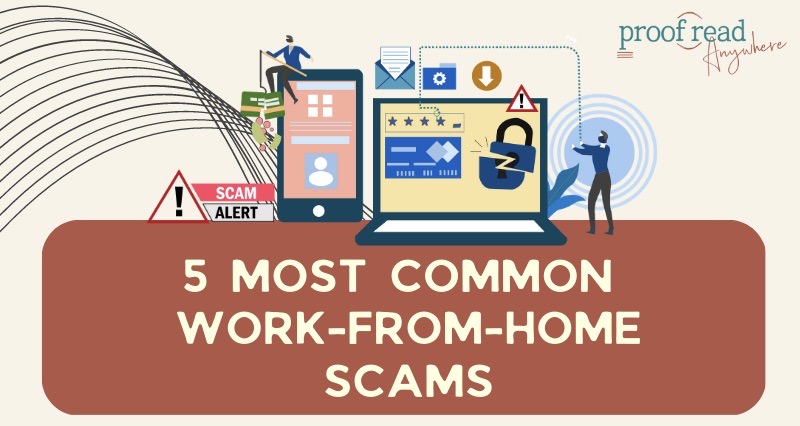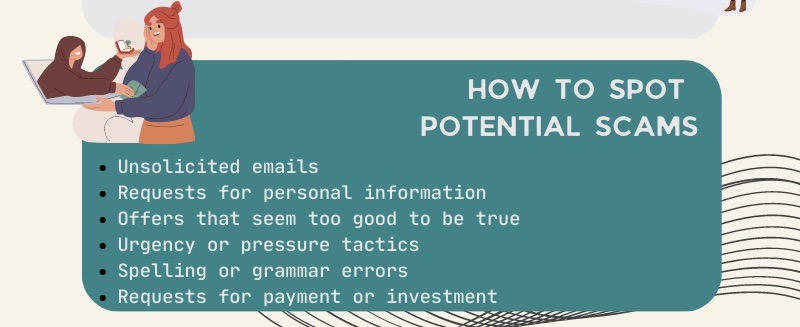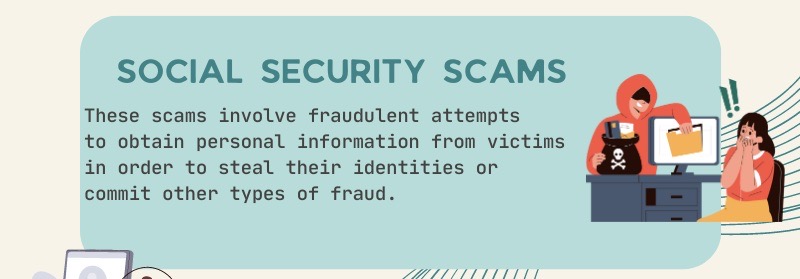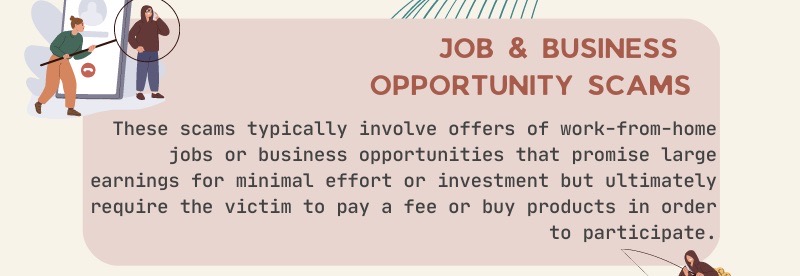How to Avoid Work-From-Home Scams
With the rapid shift to remote work, work-from-home scams have become increasingly commonplace.
And while the internet is full of enticing remote job opportunities, it’s important to be aware of how to spot and avoid work-from-home-related scams before you sign up for one.
A scam is any kind of fraudulent activity or scheme designed to take advantage of people and their money. Scammers use all kinds of methods to get their hands on your cash — And many times, these thieves use the internet as their weapon.
In this article, we’ll discuss tips on how to report, identify, and avoid work-from-home scams so you can spend your time on real opportunities and potential employers.
Common Types of Work-From-Home Scams

To avoid becoming a victim of an internet scam, you need to identify the telltale warning signs. Scammers may be creative, but their tricks are easy to spot if you know what to look for.
The most common types of scams that catch people who want to work from home are:
- Social security scams — These scams involve fraudulent attempts to obtain personal information from victims in order to steal their identities or commit other types of fraud
- Job opportunity/Business opportunity scams — These scams typically involve offers of work-from-home jobs or business opportunities that promise large earnings for minimal effort or investment but ultimately require the victim to pay a fee or buy products in order to participate
- Credit card and upfront payment scams — These scams involve requests for payment or credit card information upfront in exchange for promised services or products, which are often never delivered or of poor quality
- Email address and virtual assistant scams — These scams use email “recruitment” to reach people looking for a work-from-home virtual assistant or another administration job. While cold recruitment is common and can be a great way to land a job, beware that the agency contacting you and the job you’re referred for is valid before investing
- Fake checks, pyramid schemes, and other common types of online schemes — Some scams get rather elaborate and involve fake checks, pyramid schemes, and other difficult-to-detect fraudulent activities
How to Spot a Potential Job Scam

Telling an employment scam from a legitimate opportunity isn’t always easy. That’s why it’s wise to have a vetting process to double-check the validity of every opportunity that comes your way.
Here are some common signs that you may be dealing with a scam in your job search:
- Unsolicited emails — Be wary of messages or calls from organizations you’re unfamiliar with or offers that come out of the blue. Emails from contacts you’ve asked to stop contacting you are scams
- Requests for personal information — Be cautious of any hasty request for personal information, such as your Social Security number, bank account information, or password. Legitimate companies and organizations typically do not ask for this information until later in the hiring process, and all requests for personal information should include documentation explaining why and how your information will be used
- Offers that seem too good to be true — Trust your instincts and verify the agency’s website and rating on BBB if anything seems suspicious or doesn’t add up. If a job offer seems too good to be true, it’s probably a scam
- Urgency or pressure tactics — Be cautious of any message that uses urgency or pressure tactics to get you to act quickly. Scammers often use fear and urgency to get you to make hasty decisions so you don’t have time to consider any problems that don’t add up
- Spelling errors — Be reluctant to trust messages that include poor spelling or grammatical errors. Scammers may introduce spelling errors to avoid getting caught by spam filters that target certain keywords and phrases commonly found in phishing emails
- Requests for payment or investment — Be skeptical of any job offer that requires you to pay money or make an investment upfront to start working. Legitimate employers typically do not ask for payment from their employees
Now we’ll look at some of the typical employment scams you may encounter on your work-from-home job hunt.
Social Security Scams

Social Security scams are designed to get you to share your Social Security number and banking information in exchange for a promise of work or money that never materializes. These scams are common over the phone, but can also take place through text, email, or direct messages on social media. They usually involve a request for personal information right off the bat.
Legitimate employers rarely ask for Social Security numbers upfront, except for government-related jobs or a credit or background check. In any case, requests for your Social Security number should include a disclosure confirming the agency’s authority and explaining why the number is required or optional and how it will be used.
Social security scams can target anyone, but they’re more likely to target vulnerable populations such as the elderly or those who are unemployed and looking for work.
If you’ve been targeted by one of these scams, report it to the Federal Trade Commission (FTC) as soon as possible so they can take action against those responsible for fraudulent activity.
Job and Business Opportunity Scams

Faux jobs or business opportunity scams are attempts to extract your personal banking information. And worse yet, some of these scams can implicate you in the scam!
Scammers may falsely use the names of real businesses and post remote job opportunities online promising high pay and flexible schedules. Be cautious of online jobs that ask for money or personal information disguised as a request to run a credit check, make a direct deposit, or pay for training.
Rather than offering job opportunities, business opportunity scams promise very large sums of money to their victims for making an initial investment in the scammer’s enterprise. These “opportunities” may even come from a real person, but the investments are not real.
The intention is to get funds or banking information before anything official happens while the scammer makes away with your money. Nearly anyone could be targeted by a job opportunity scam, though you’re more vulnerable if you’re on the hunt for employment or searching on job boards.
Credit Card and Upfront Payment Scams

Though the phrase “spend money to make money” is accurate in some cases, you should still be wary of services or investments requiring you to pay immediately with a credit card or wire transfer.
An increasing number of fraudulent schemes take advantage of people’s financial insecurity by sending bogus offers for jobs, opportunities, or rewards. However, these scams typically ask for upfront payment or charge a membership fee to access the promised funds.
Scammers may target you if you have a good credit score, are an active credit user, have a history of making large purchases, or are looking at job sites or job postings. Avoid credit card and upfront payment scams by refusing to share credit card information or pay for services, products, or training without verifying that the agency is legitimate.
Protect your assets from fraud by monitoring your accounts for fraudulent activity, and, if someone does trick you into a credit card scam, contact your credit card company immediately.
Email Phishing Scams

Cybercriminals “phish” by posing as one of your online contacts, emailing you with an offer, and requesting your personal information.
When given access to your information, scammers can steal your identity or use your accounts to fund a malicious campaign at your expense. Always be skeptical of unsolicited emails that request you to provide personal information like passwords, usernames, and bank information.
Anyone can be targeted by a phishing scam, but you may be particularly vulnerable if you don’t utilize spam filters or proper inbox hygiene to weed out potentially dangerous emails. Report suspicious messages to your email provider and block any accounts that ask for your information without knowing you or being contacted by you.
Virtual Assistant Scams
Scammers may pose as legitimate companies offering remote virtual assistant job opportunities. These scammers often lure their victims with promises of high-paying jobs requiring little to no experience, but in reality, the job doesn’t exist or is a cover for illegal activities, like identity theft.
Virtual assistant scams typically target people actively seeking remote employment opportunities, such as stay-at-home parents or individuals who are unemployed or under-employed. Scammers may also target college students looking for extra cash, or recent graduates seeking entry-level work.
If you suspect a scam of this nature, report it to the appropriate authorities, such as the Federal Trade Commission or your local law enforcement agency.
Fake Check Scams

Some online employment scams use fake checks and the promise of quick money to entrap unsuspecting job seekers. For example, you may be offered an official-looking check as a starting bonus and be asked to cover the cost of “account activation.” The scammer’s intention is to receive the funds from the victim before the check clears and the victim realizes they’ve been scammed.
Historically, fake checks have been around since the late 1800s, But the tactic has increased in prevalence with online platforms and messaging apps making it easier than ever for scammers to reach potential victims.
Fake check employment scams usually target people looking for work or seeking to earn extra income. If you believe you have been targeted by a fake check employment scam, you can report it to several organizations, including the FTC or the Internet Crime Complaint Center (IC3).
Pyramid Schemes
The pyramid scheme is the most notorious scam targeting individuals looking for passive income opportunities. Also known as multi-level marketing (MLM) schemes, this type of fraud requires individuals to purchase products upfront and recruit others to sell the products.
These schemes focus on recruitment rather than sales, and the only way to make money is by recruiting more people. Scammers use this tactic to get you to do their dirty work for them. For example, they might promise an increase in earnings if you can help bring more people into their plot.
MLM schemes are notorious for targeting women, especially stay-at-home moms, and use language like “boss babe” or “girl boss” to prey on female friendship and the dream of owning a business.
Real employers typically don’t require any upfront investment, and their focus is on providing actual work, not recruitment. If you suspect that you have encountered a work-from-home pyramid scheme, report it to the appropriate authorities, such as the FTC or your local law enforcement agency.
Reshipping Scams
Reshipping scams are a specific type of work-from-home employment scam involving criminals using unwitting victims to receive and forward packages, typically purchased with stolen credit card information or other illegal funds.
The scammer first sets up a fake online store or another website offering high-priced products or goods at a steep discount. The victim is then recruited to become a “reshipper,” agreeing to receive packages at their home address and then repackage and send them on to another address, typically out of the country.
As a victim, you may be promised payment for your services, but in reality, the packages contain stolen or counterfeit goods, and the entire scheme is part of a larger criminal operation that never intends to pay you.
People typically targeted include those who have their contact information posted publicly online or those who are desperate to earn some extra cash. Report any suspected reshipping scam to your local law enforcement agency.
Tips to Avoid Work-from-Home Scams
The prospect of landing a great proofreading job online or another job working from home can be exciting, but it’s important to be aware of potential scam risks that come with the work-from-home industry.
With a bit of knowledge and caution, you can protect yourself from falling victim to a work-from-home job scam.
Here are the best tips to stay away from scam job postings and remote work scams.
Research the Company’s Reputation
The best way to avoid a work-from-home job scam is by ensuring the validity of the organization before applying or interviewing.
Here are some quick tips to verify a reputable company:
- Check the company’s website — If the site looks like a mess, has very little information, or is based in a foreign country, that’s a bad sign!
- Check social media — If the company doesn’t have any social media presence, that can be a red flag, however, IT and specialized B2B companies may not use social media to market themselves. If they do, you can check for inconsistencies or clues in their content that don’t add up.
- Check forums — Read reviews on websites like Yelp, Google, Trustpilot, and Facebook. If you can’t find any reviews, it may be a sign that the company isn’t well-known or they’re trying to keep their business out of sight.
- Check the Better Business Bureau (BBB) Scam Tracker — If a business has been reported to the BBB, it may be a sign that the company isn’t operating in good faith. The BBB Scam Tracker can help you spot fraudulent organizations that have already been reported. You can also call the BBB to ensure that any company you’re researching is still in operation
Even when you’re dealing with a real company, it’s wise to do your research before signing the dotted line. In the case of work-from-home scams, this research could help you quickly spot fake companies trying to take advantage of you.
Verify Job Offers
Even after researching the actual company, be sure to verify any job offers you receive during your job search. Scammers may pose as legitimate companies that you’re already familiar with to gain your trust — a well-known tactic for remote jobs.
If you’re unsure about a job offer, contact the company directly using their official website or phone number to confirm the offer is a real job with a real company. You can also look at the company’s other job listings — If they’re offering multiple new positions without a clear reason, this could be another red flag!
Even if it seems like you’re conversing with a real employer, it never hurts to go the extra distance to verify that an offer for a remote position is legit.
Shy From Quick and Easy Money
You may find yourself tempted by offers that seem too good to be true. Don’t be fooled.
Notice that when we talk about how much proofreaders make, we provide wide estimates and make sure that our readers and students understand that the job isn’t for everyone and isn’t easy. Finding clients and doing a good job is just as essential as understanding grammar and language.
Any company that promises quick and easy money or thousands of dollars in your bank account without any hard work or real effort on your part is very likely a scam. There is no such thing as easy money in this world!
While lucrative offers and quick money schemes may seem enticing at first glance, the truth is that there are often many hidden costs with these scams. With a keen and rational eye, you should be able to weed out bogus job offers by taking a few minutes to do some research and compare the terms of these offers with industry standards.
Never Pay to Work
In most cases, legitimate work-from-home jobs don’t require you to pay money to start working. This should be a glaring warning sign that you’re dealing with a common scam.
Steer clear of any remote job that requires an upfront payment or investment. Scammers often ask for payment for “training,” “equipment,” or “application fees” — Do yourself a favor and remove these offers from your short list of potential jobs.
There are many legitimate work-from-home jobs that you can do without paying a penny — and your time would be better spent pursuing one of these options.
Many newcomers to the work-from-home industry have found success as remote proofreaders. To see if proofreading is right for you, check out our free workshop.
How to Report a Work-from-Home Scam
There are several ways to officially report a scam and it’s important that you choose one that fits your situation.
Reporting a scam is important for both yourself as well as regulatory agencies and law enforcement, so they can take necessary steps to protect other potential victims from falling into the same trap.
You can report work-from-home scams directly to the Federal Trade Commission (FTC) or, if your jurisdiction allows it, to your local law enforcement agency. Additionally, you may file a complaint with the Better Business Bureau (BBB) which will warn others of the potential scam.
You can also report the scam to the Internet Crime Complaint Center (IC3). The IC3 is a partnership between the FBI, the National White Collar Crime Center, and the Bureau of Justice Assistance that allows people to report cybercrime and fraud online.
If you’ve been scammed or have fallen victim to fraud, it’s important to not only report the activity but also to take action to protect yourself from further damage. Make sure to protect yourself by contacting your banking institutions to inform them of the fraud and by changing the passwords to your sensitive personal accounts.
If you’re not sure who to call or where to send your complaint, contact your state attorney general’s office — They can point you in the right direction.
Conclusion
There are a variety of work-from-home job scams that could take advantage of you if you don’t do your due diligence. It’s important to be vigilant when searching for work-from-home jobs and to do research on employers before applying for jobs.
Take the time to identify which employers are legitimate to save yourself from wasted time, energy, and financial losses, and for a smooth and successful remote working experience.
And, if you’re looking to get a start as a remote proofreader, click here for a free 7-day trial of our Transcript Proofreading course — It’s a great starting point for launching your first remote job or home business!

Caitlin, thank you for the information. It was very helpful. I never had any doubt about your ligitamacy!
The internet is quite an overwhelming world to explore and there are usually traps laid out everywhere.
Your guidance is valuable indeed , may these tips help others too!
It's helpful. I got a lot information here.